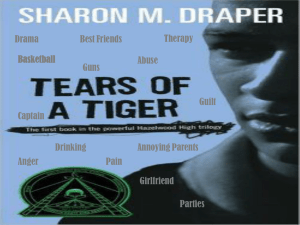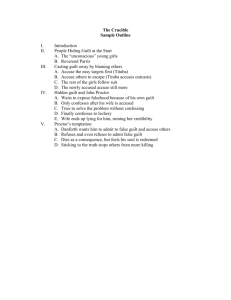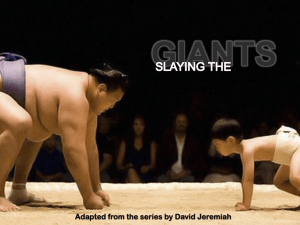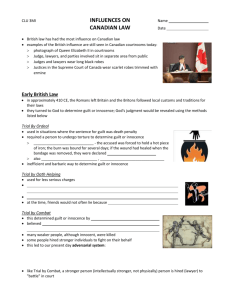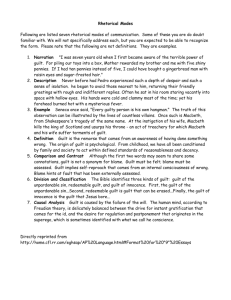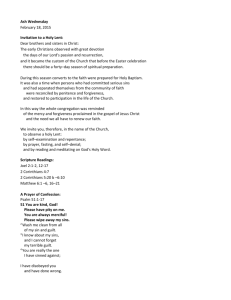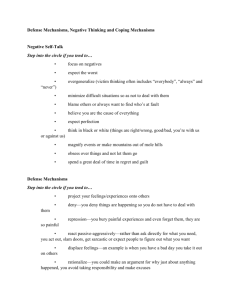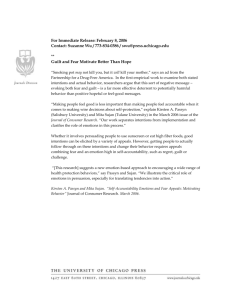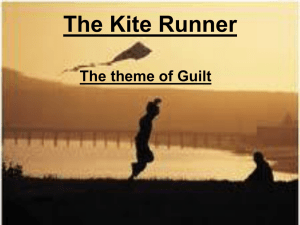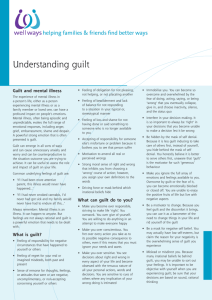When I was in seminary, a popular book making the rounds was
advertisement
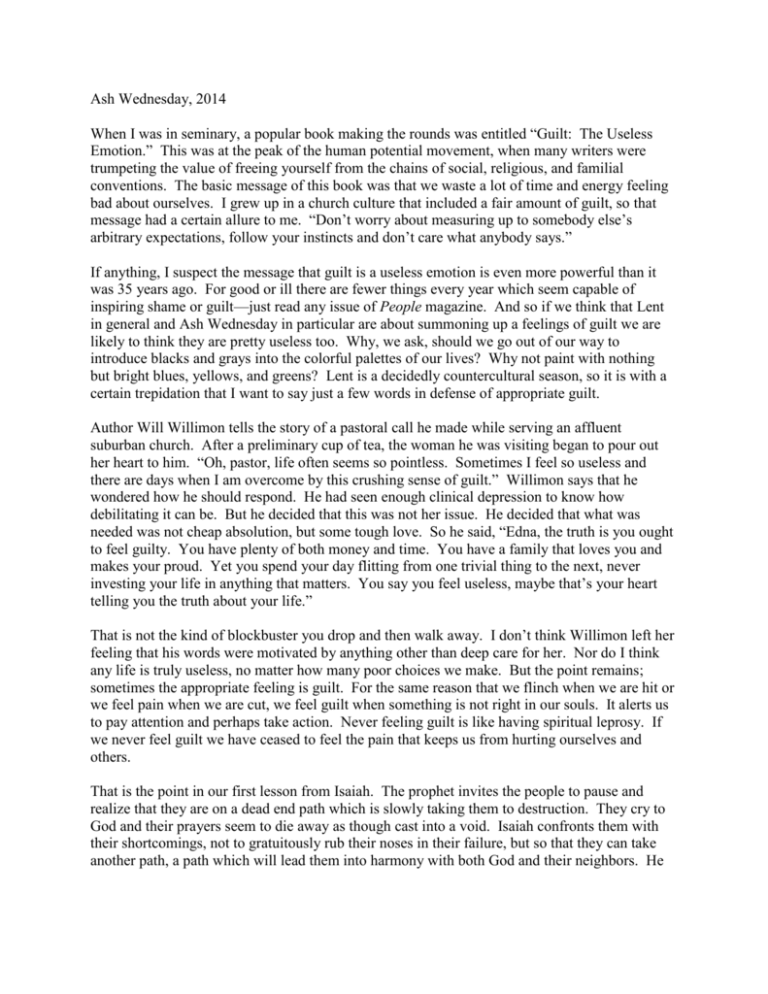
Ash Wednesday, 2014 When I was in seminary, a popular book making the rounds was entitled “Guilt: The Useless Emotion.” This was at the peak of the human potential movement, when many writers were trumpeting the value of freeing yourself from the chains of social, religious, and familial conventions. The basic message of this book was that we waste a lot of time and energy feeling bad about ourselves. I grew up in a church culture that included a fair amount of guilt, so that message had a certain allure to me. “Don’t worry about measuring up to somebody else’s arbitrary expectations, follow your instincts and don’t care what anybody says.” If anything, I suspect the message that guilt is a useless emotion is even more powerful than it was 35 years ago. For good or ill there are fewer things every year which seem capable of inspiring shame or guilt—just read any issue of People magazine. And so if we think that Lent in general and Ash Wednesday in particular are about summoning up a feelings of guilt we are likely to think they are pretty useless too. Why, we ask, should we go out of our way to introduce blacks and grays into the colorful palettes of our lives? Why not paint with nothing but bright blues, yellows, and greens? Lent is a decidedly countercultural season, so it is with a certain trepidation that I want to say just a few words in defense of appropriate guilt. Author Will Willimon tells the story of a pastoral call he made while serving an affluent suburban church. After a preliminary cup of tea, the woman he was visiting began to pour out her heart to him. “Oh, pastor, life often seems so pointless. Sometimes I feel so useless and there are days when I am overcome by this crushing sense of guilt.” Willimon says that he wondered how he should respond. He had seen enough clinical depression to know how debilitating it can be. But he decided that this was not her issue. He decided that what was needed was not cheap absolution, but some tough love. So he said, “Edna, the truth is you ought to feel guilty. You have plenty of both money and time. You have a family that loves you and makes your proud. Yet you spend your day flitting from one trivial thing to the next, never investing your life in anything that matters. You say you feel useless, maybe that’s your heart telling you the truth about your life.” That is not the kind of blockbuster you drop and then walk away. I don’t think Willimon left her feeling that his words were motivated by anything other than deep care for her. Nor do I think any life is truly useless, no matter how many poor choices we make. But the point remains; sometimes the appropriate feeling is guilt. For the same reason that we flinch when we are hit or we feel pain when we are cut, we feel guilt when something is not right in our souls. It alerts us to pay attention and perhaps take action. Never feeling guilt is like having spiritual leprosy. If we never feel guilt we have ceased to feel the pain that keeps us from hurting ourselves and others. That is the point in our first lesson from Isaiah. The prophet invites the people to pause and realize that they are on a dead end path which is slowly taking them to destruction. They cry to God and their prayers seem to die away as though cast into a void. Isaiah confronts them with their shortcomings, not to gratuitously rub their noses in their failure, but so that they can take another path, a path which will lead them into harmony with both God and their neighbors. He speaks a hard word, but he also offers them a promise if they turn to God, “Then you shall call, and the Lord will answer; you shall cry for help, and he will say, Here I am.” So what does all this mean on Ash Wednesday as we prepare to enter the season of Lent? I said I wanted to say a good word for guilt. Maybe that was not exactly right. Maybe I should have said I want to say a good word for taking time to be honest with ourselves and God. That is really what this season is about, intentionally stepping out of our normal routine to ask hard questions of ourselves. The goal is not guilt but discernment. I don’t know how many of you saw All is Lost, the powerful movie featuring Robert Redford as a man whose sailing ship wrecks, leaving him adrift in the Indian Ocean. The film is an account of all that he does to survive. One of the most powerful images in the film is the way he tracks his progress in that vast ocean. Each day he laboriously shoots the sun with a sextant and then diligently marks his position on the map. The series of “exes” graphically illustrates how he is drifting toward, then into, then out of the nautical shipping lane which contains his best hope for finding a rescue ship. Each day he makes the effort to figure out exactly where he is as the currents push him along. If that is important for a drifting, shipwrecked sailor with little control over his path, how much more important is it for us who have some control over our course. Lent is the time when we shoot the sun of our spirits, when we figure out where our lives are relative to God, our dreams, and our intentions for our lives. Lent is a time to take stock of where we are and where we want to be. Yes, we may make some painful discoveries. We may realize that we have made some mistakes. We may discover we drifting along with little direction. Yes, we may even feel a little guilt about what should have been, could have been, ought to be. If we stay there, then guilt is indeed a useless emotion. But this day and the Lenten season are not intended to leave us in despair. God calls us to see our mistakes and turn to more fruitful paths. Beyond the pain of guilt is the release of forgiveness. Beyond the shortcomings of the past is the invitation to rise again, to rest in God’s love, and to live in the confidence that the past really is the past and divine mercy is always---always bigger than our guilt.
